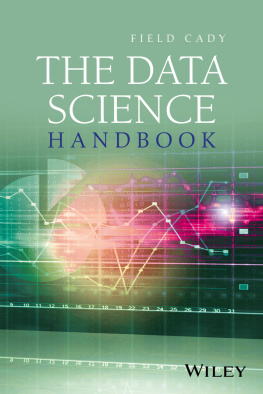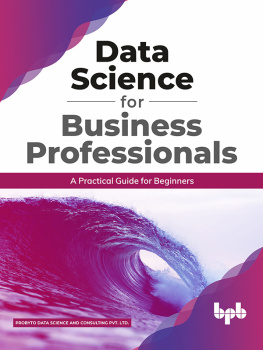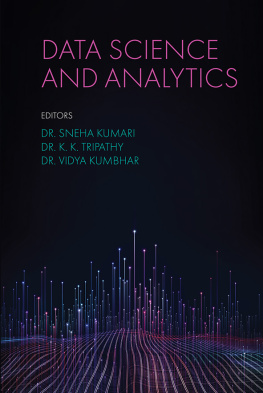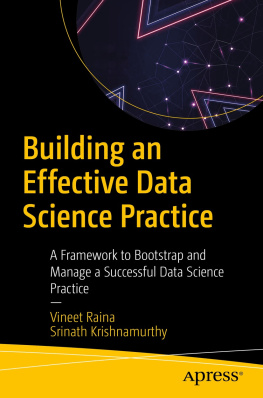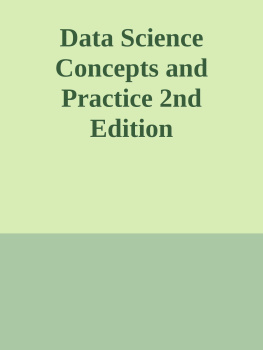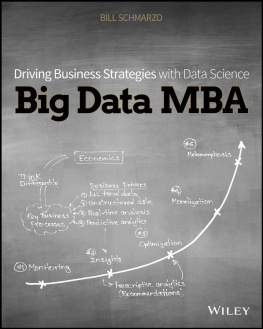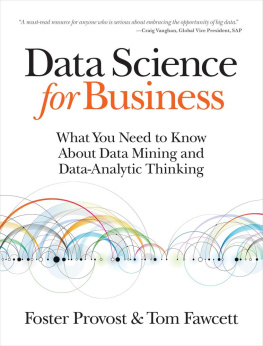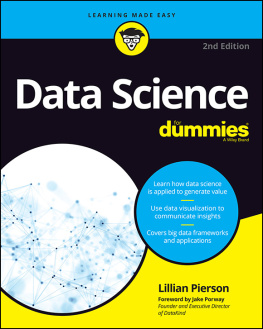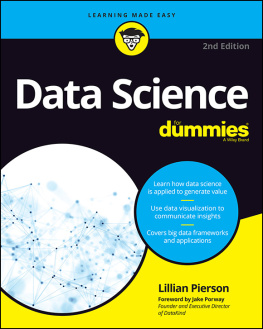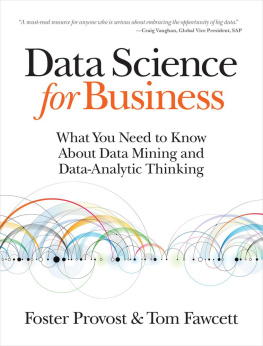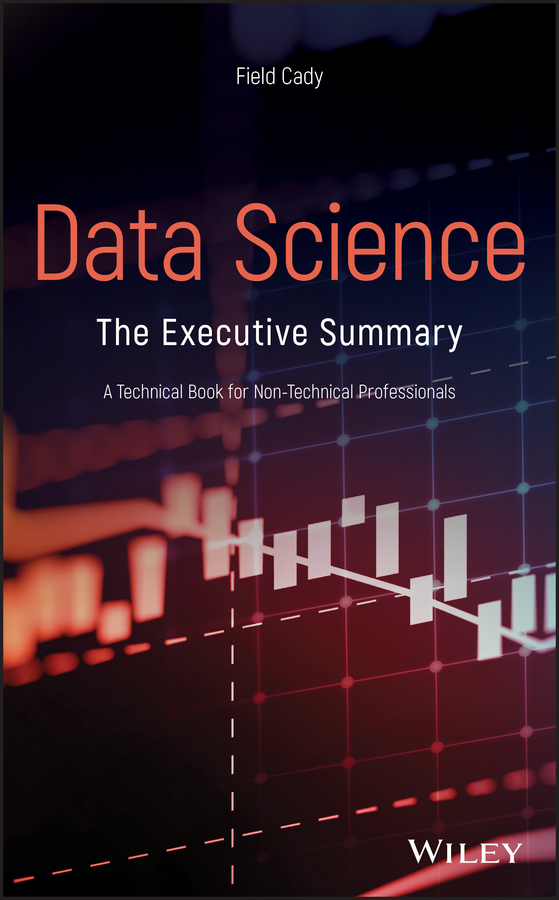
Table of Contents
List of Tables
- Chapter 2
- Chapter 6
- Chapter 7
List of Illustrations
- Chapter 2
- Chapter 4
- Chapter 5
- Chapter 6
- Chapter 7
Guide
Pages
Data Science: The Executive Summary
A Technical Book for Non-Technical Professionals
Field Cady

Copyright
This edition first published 2021
2021 by John Wiley & Sons, Inc.
All rights reserved. No part of this publication may be reproduced, stored in a retrieval system, or transmitted, in any form or by any means, electronic, mechanical, photocopying, recording or otherwise, except as permitted by law. Advice on how to obtain permission to reuse material from this title is available at http://www.wiley.com/go/permissions.
The right of Field Cady to be identified as the author of this work has been asserted in accordance with law.
Registered Office
John Wiley & Sons, Inc., 111 River Street, Hoboken, NJ 07030, USA
Editorial Office
111 River Street, Hoboken, NJ 07030, USA
For details of our global editorial offices, customer services, and more information about Wiley products visit us at www.wiley.com.
Wiley also publishes its books in a variety of electronic formats and by printondemand. Some content that appears in standard print versions of this book may not be available in other formats.
Limit of Liability/Disclaimer of Warranty
While the publisher and authors have used their best efforts in preparing this work, they make no representations or warranties with respect to the accuracy or completeness of the contents of this work and specifically disclaim all warranties, including without limitation any implied warranties of merchantability or fitness for a particular purpose. No warranty may be created or extended by sales representatives, written sales materials or promotional statements for this work. The fact that an organization, website, or product is referred to in this work as a citation and/or potential source of further information does not mean that the publisher and authors endorse the information or services the organization, website, or product may provide or recommendations it may make. This work is sold with the understanding that the publisher is not engaged in rendering professional services. The advice and strategies contained herein may not be suitable for your situation. You should consult with a specialist where appropriate. Further, readers should be aware that websites listed in this work may have changed or disappeared between when this work was written and when it is read. Neither the publisher nor authors shall be liable for any loss of profit or any other commercial damages, including but not limited to special, incidental, consequential, or other damages.
Library of Congress CataloginginPublication Data
Names: Cady, Field, 1984 author.
Title: Data science : the executive summary : a technical book for
nontechnical professionals / by Field Cady.
Description: Hoboken, NJ : Wiley, 2021. | Includes bibliographical
references and index.
Identifiers: LCCN 2020024708 (print) | LCCN 2020024709 (ebook) | ISBN
9781119544081 (hardback) | ISBN 9781119544166 (adobe pdf) | ISBN
9781119544173 (epub)
Subjects: LCSH: Data mining.
Classification: LCC QA76.9.D343 C33 2021 (print) | LCC QA76.9.D343
(ebook) | DDC 006.3/12dc23
LC record available at https://lccn.loc.gov/2020024708
LC ebook record available at https://lccn.loc.gov/2020024709
Cover Design: Wiley
Cover Image: monsitj/Getty Images
For my Uncle Steve, who left the world on the day this book was finished.
And for my son Cyrus, who entered shortly thereafter.
Introduction
1.1 Why Managers Need to Know About Data Science
There are many data science for managers books on the market today. They are filled with business success stories, pretty visualizations, and pointers about what some of the hot trends are. That material will get you rightfully excited about data science's potential, and maybe even get you started off on the right foot with some promising problems, but it isn't enough to see projects over the finish line or bring the full benefits of data to your organization. Depending on your role you may also need to decide how much to trust a piece of analytical work, make final calls about what tools your company will invest in, and hire/manage a team of data scientists. These tasks don't require writing your own code or performing mathematical derivations, but they do require a solid grounding in data science concepts and the ability to think critically about them.
In the past, mathematical disciplines like statistics and accounting solved precisely defined problems with a clear business meaning. You don't need a STEM degree to understand the idea of testing whether a drug works or balancing a checkbook! But as businesses tackle more openended questions, and do so with datasets that are increasingly complex, the analytics problems become more ambiguous. A data science problem almost never lines up perfectly with something in a textbook; there is always a business consideration or data issue that requires some improvisation. Flexibility like this can become recklessness without fluency in the underlying technical concepts. Combine this with the fact that data science is fast becoming ubiquitous in the business world, and managers and executives face a higher technical bar than they ever did in the past.
Business education has not caught up to this new reality. Most careers follow a business track that teaches few technical concepts, or a technical track that focuses on handson skills that are useless for businesspeople. This book charts a middle path, teaching nontechnical professionals the core concepts of modern data science. I won't teach you the brass tacks of how to do the work yourself (that truly is for specialists), but I will give you the conceptual background you need to recognize good analytics, frame business needs as solvable problems, manage data science projects, and understand the ways data science is likely to transform your industry.
In my work as a consultant I have seen PMs struggle to mediate technical disagreements, ultimately making decisions based on peoples' personalities rather than the merits of their ideas. I've seen largescale proofofconcept projects that proved the wrong concept, because organizers set out inappropriate success metrics. And I've seen executives scratching their heads after contractors deliver a result, unable to see for themselves whether they got what they paid for.
Conversely, I have seen managers who can talk shop with their analysts, asking solid questions that move the needle on the business. I've seen executives who understand what is and isn't feasible, instinctively moving resources toward projects that are likely to succeed. And I've seen nontechnical employees who can identify key oversights on the part of analysts and communicate results throughout an organization.
Most books on data science come in one of two types. Some are written for aspiring data scientists, with a focus on example code and the gory details of how to tune different models. Others assume that their readers are unable or unwilling to think critically, and dumb the technical material down to the point of uselessness. This book rejects both those approaches. I am convinced that it is not just possible for people throughout the modern business workforce to learn the language of data: it is essential.
Next page

